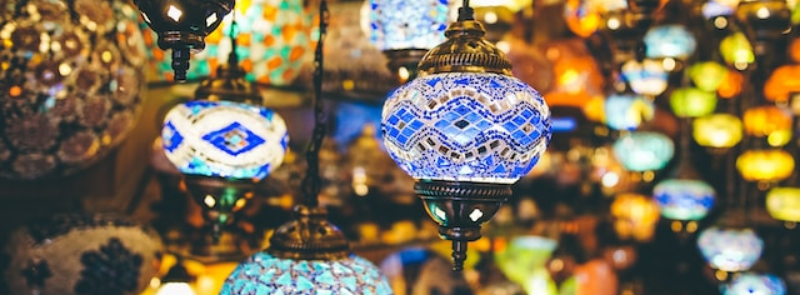
When It Occurs
Annually During First Three Days of Shawwal
Timeline
Days Passed (684)
# Hashtags
#EidAlFitr #FestivalOfBreakingTheFast
Eid al-Fitr, also known as the "Festival of Breaking the Fast," is a significant Islamic celebration marking the conclusion of Ramadan. This joyous occasion occurs during the first three days of Shawwal, the 10th month in the Islamic calendar. Due to the lunar nature of the calendar, Eid al-Fitr can occur in any season.
The festivities typically commence with a communal prayer service in the morning, uniting the Muslim community. Subsequently, people come together for shared meals and engaging conversations with friends and family. Eid al-Fitr serves as a time to reflect on the accomplishments of the preceding month and to fortify the spiritual connection with Allah.
Historical Context
- Origins: Eid al-Fitr was established by the Prophet Muhammad and has been celebrated by Muslims around the world since the early days of Islam. The holiday commemorates the conclusion of Ramadan, during which Muslims fast from dawn to sunset.
- Religious Significance: The holiday is rooted in Islamic teachings and traditions, emphasizing gratitude, charity, and community.
Timing and Observance
- Lunar Calendar: Eid al-Fitr falls on the first day of Shawwal, the tenth month of the Islamic lunar calendar. The exact date varies each year based on the sighting of the moon.
- Eid Moon Sighting: The sighting of the new moon marks the end of Ramadan and the beginning of Eid al-Fitr. This practice can lead to variations in the celebration date across different countries and regions.
Purpose and Significance
- Spiritual Renewal: Eid al-Fitr is a time for Muslims to celebrate their spiritual achievements during Ramadan and seek forgiveness and blessings.
- Community and Charity: The holiday emphasizes the importance of community, family, and charity. It is a time to strengthen social bonds and support those in need.
- Gratitude: Eid al-Fitr is an opportunity to express gratitude to Allah for the strength to complete the fast and for the blessings received throughout the year.
Traditions and Customs
- Eid Prayers (Salat al-Eid): Special congregational prayers are performed in the morning, usually held in mosques or open areas. These prayers are a significant aspect of the celebration.
- Charity (Zakat al-Fitr): Before the Eid prayer, Muslims are required to give Zakat al-Fitr, a form of charity intended to purify those who fast from any indecent act or speech and to help the poor and needy.
- Feasting and Meals: After a month of fasting, Eid al-Fitr is marked by festive meals. Traditional dishes vary by region, but the emphasis is on sharing and enjoying food with family and friends.
- Family and Social Gatherings: Families and friends come together to celebrate, exchange gifts, and offer greetings such as "Eid Mubarak" (Blessed Eid).
- New Clothes: Wearing new or the best available clothes is a common tradition, symbolizing purity and renewal.
Regional Variations
- Middle East: In countries like Saudi Arabia, Egypt, and the UAE, large community prayers are held, and public festivities include parades, fairs, and fireworks.
- South Asia: In countries like Pakistan, India, and Bangladesh, families prepare special sweets like Sheer Khurma and Seviyan, and traditional music and dance are part of the celebrations.
- Southeast Asia: In Indonesia and Malaysia, Eid is known as Hari Raya Aidilfitri, and the celebrations include visiting relatives and friends, and preparing traditional dishes like Ketupat and Rendang.
- Africa: In countries like Nigeria and Kenya, community prayers are followed by large family gatherings, and traditional dishes and attire play a significant role in the festivities.
- Western Countries: Muslim communities in the West celebrate Eid with community prayers, social gatherings, and cultural events, often integrating local customs and traditions.
Modern Trends
- Virtual Celebrations: Due to the COVID-19 pandemic, many Muslims have adapted by participating in virtual prayers and celebrations, maintaining social connections while adhering to safety protocols.
- Inclusivity and Diversity: Eid al-Fitr celebrations have become more inclusive, with interfaith events and community outreach programs promoting understanding and unity.
- Sustainable Practices: There is a growing emphasis on sustainable and eco-friendly practices during Eid, such as reducing food waste and using eco-friendly decorations.
Challenges
- Moon Sighting Differences: Variations in moon sighting practices can lead to different celebration dates within the same country or community, sometimes causing confusion.
- Economic Hardships: Economic difficulties can affect the ability of some families to fully participate in the festivities, highlighting the importance of community support and charity.
How to Get Involved
- Learn and Respect: Educate yourself about the significance of Eid al-Fitr and respect the customs and traditions of those who celebrate it.
- Join Celebrations: Participate in local Eid events or accept invitations from Muslim friends or colleagues to join in their celebrations.
- Charity and Volunteering: Contribute to or volunteer with organizations that provide support to those in need during Eid.
- Cultural Exchange: Engage in cultural exchange programs or events that promote understanding and appreciation of diverse traditions.
Eid al-Fitr is a joyful and significant celebration that brings Muslims together to mark the end of Ramadan with gratitude, charity, and community. By understanding and participating in Eid al-Fitr traditions, individuals from all backgrounds can foster greater cultural awareness and unity.


